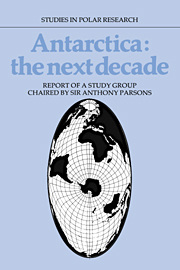Book contents
- Frontmatter
- Contents
- Acronyms
- The Study Group
- Preface
- Political map of Antarctica
- Geographical map of Antarctica
- Part I The Antarctic Treaty System under stress?
- 1 The Antarctic Treaty I: its original and continuing value
- 2 The Antarctic Treaty II: the case for change
- 3 The Antarctic Treaty III: non-governmental organisations, conservation and the environment
- Part II Uses of Antarctica
- Part III The future
- Appendices
- Notes and references
- Index
3 - The Antarctic Treaty III: non-governmental organisations, conservation and the environment
Published online by Cambridge University Press: 04 August 2010
- Frontmatter
- Contents
- Acronyms
- The Study Group
- Preface
- Political map of Antarctica
- Geographical map of Antarctica
- Part I The Antarctic Treaty System under stress?
- 1 The Antarctic Treaty I: its original and continuing value
- 2 The Antarctic Treaty II: the case for change
- 3 The Antarctic Treaty III: non-governmental organisations, conservation and the environment
- Part II Uses of Antarctica
- Part III The future
- Appendices
- Notes and references
- Index
Summary
For many non-governmental organisations (NGOs) the current interest in the future of the Antarctic has been a wonderful opportunity. Where else can one at the same time question concepts of sovereignty, security, international equity, the environment and the rule of international law, without regard to indigenous people? Where else can the untouched beauty of the Earth be presented so evocatively, and the opportunity for political adventurism, or even mischief making – all in the name of ideals – be so easily secured? Yet when all the initial rhetoric of the campaigners is peeled away what remains is not entirely clear, or straightforward. It is easy enough for them to call for ‘internationalising the area’, ‘creating a World Park’, and ‘opening up the Antarctic system’, but when the implications of such demands are understood in terms of continued demilitarisation, non-exploitation or regulated exploitation of resources, and modifications to the sovereignty claims, then their demands become mixed up with the realities of political power and, as a result, become less clear.
Contrary to popular belief many of the demands of the NGOs are hardly radical. Greenpeace International, for example, does not call for the abolition of the Antarctic Treaty, and the International Union for the Conservation of Nature and Natural Resources (IUCN) has modified its original demands for a World Park in Antarctica. When faced with the representatives of governments the leaders of most organisations appear to be open to argument and compromise.
- Type
- Chapter
- Information
- Antarctica: The Next DecadeReport of a Group Study Chaired by Sir Anthony Parsons, pp. 34 - 44Publisher: Cambridge University PressPrint publication year: 1987



